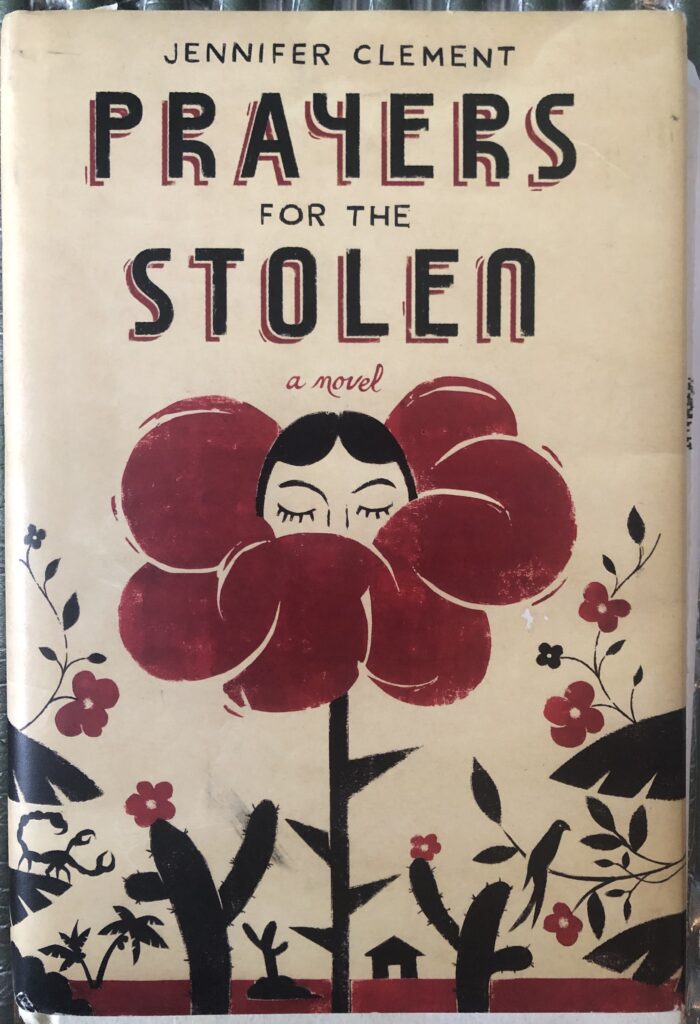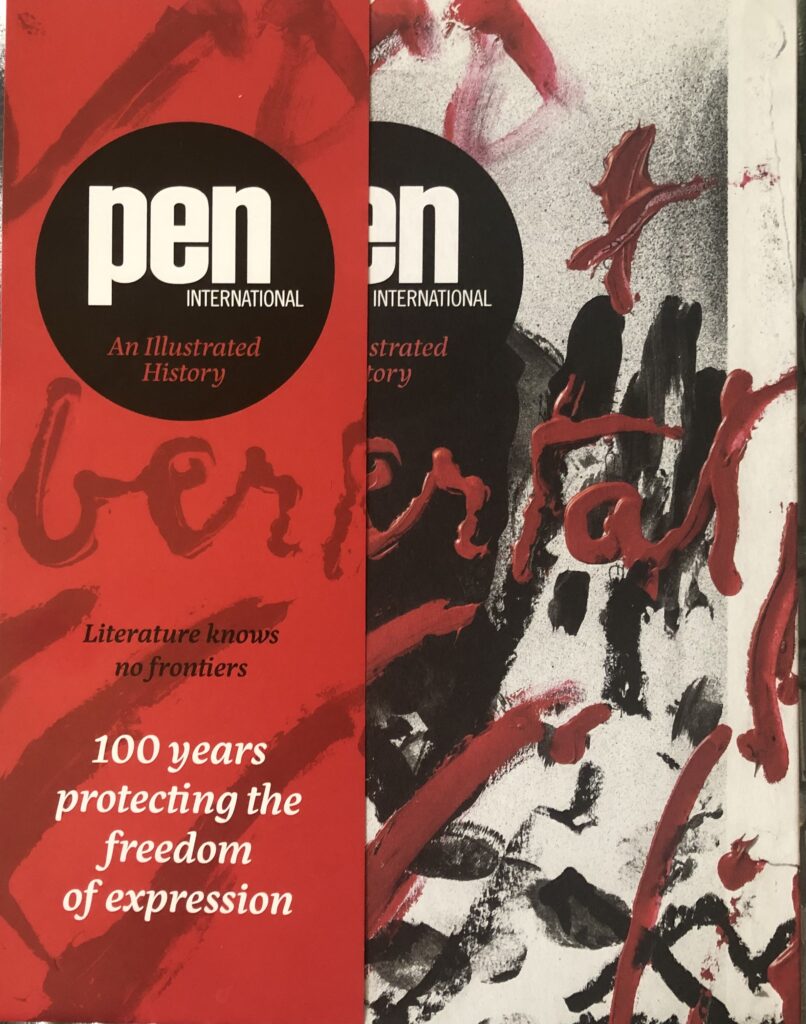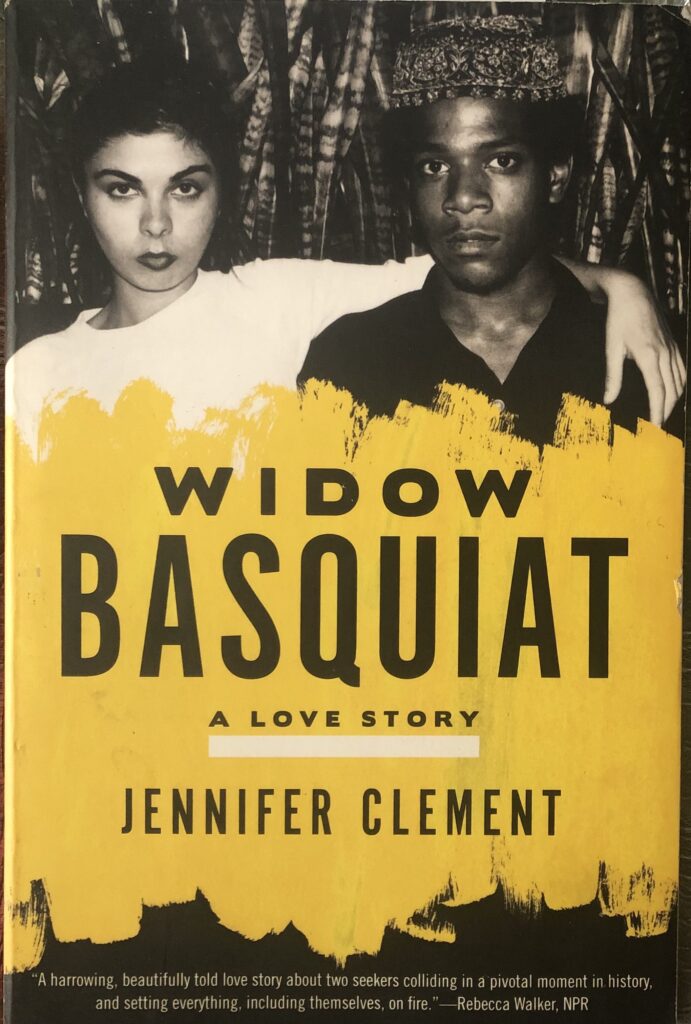
Jennifer Clement’s novel Prayers for the Stolen, focusing on girls stolen by Mexican crime mafias, is now a film (on Netflix) and Mexico’s selection for an Academy Award for Best Foreign Film. It has received honors at Cannes and at many international film festivals. Clement’s books have been translated into thirty-five languages and have won American and international awards. Gun Love, a fiction about actual gun smuggling from the United States to Mexico, is being made into a movie by Lion King creator Julie Taymor.
Clement’s poetry includes: The Next Stranger (with an introduction by W.S. Merwin), Newton’s Sailor, Lady of the Broom, and Jennifer Clement: New and Selected Poems. In addition, Clement has served as President of PEN Mexico (2009-2012) and PEN International President (2015-2021), Clement has helped to make the world safer for those who choose to speak up for human rights and speech in countries where journalists, students, and citizens’ lives may be in danger. This interview took place on November 18, 2021, at La Palapa, New York City.
• • •
 Jan Castro: Jennifer, how many years did it take to write Prayers for the Stolen? How much research did you do?
Jan Castro: Jennifer, how many years did it take to write Prayers for the Stolen? How much research did you do?
Jennifer Clement: It took a long time because I didn’t really know what story I was looking for. All I knew was that the violence in Mexico was affecting women and being ignored. I started working on the research in 2007, and until 2009, I was interviewing women of drug traffickers. Then I heard the story about the little girls hidden in the ground so as not to be stolen, and I knew that that was going to be my novel. Of course, all the research I had done turned out to be important because I then knew exactly where these girls were being taken. Part three of the book (not in the film) takes place in the Mexico City women’s jail, where I visited over a period of nine months, maybe twice a month, getting to know the prisoners and their stories. This is a work of fiction, but it stands on a large iceberg of research.
When I was President of PEN Mexico, twice I had all four tires slashed, and twice all the telephone and internet cables were cut and shredded in my house, and I had to not live in my house then for a while.
Castro: You suggest in the novel that some incidents are too gruesome to be told—or they would endanger your life.
Clement: Yes. Some of the research is confidential. I can’t divulge it. I had to leave the country after writing Prayers for the Stolen because one important publication—Proceso—akin to Time Magazine of Mexico—published a part of my novel in the news section, not in the cultural pages. It was too dangerous to stay in Mexico, and I spent some time in Pittsburgh—at ICORN’s City of Refuge. After a month or two, I went to New York. I had to stay out of Mexico for a while.
Castro: Did you get a warning? What was it?
Clement: That we’re gonna kill you. When I was President of PEN Mexico, twice I had all four tires slashed, and twice all the telephone and internet cables were cut and shredded in my house, and I had to not live in my house then for a while.
Castro: You don’t know who did it?
Clement: No. It was most likely criminal mafias colluded with state governments. They don’t want anyone interfering, and I was very outspoken about the killing of journalists all over Mexico.
Castro: Did you make up the drug lord McClane in your novel?
Clement: Yes.
Castro: You stole his name from the Bruce Willis Die Hard film and made up his ….
Clement: Yes. Most drug lords have nicknames.
Castro: How did you decide to narrate Prayers for the Stolen and Gun Love in the voices of girls?
Clement: Good question. It’s mysterious. I heard Ladydi in my head, and then I heard Pearl in my head, too. For me, the two novels are a diptych. Pearl, in Prayers for the Stolen, is the American girl who is very white, based on a real young USA girl I was told about, who lives up in the mountains. Pearl is the protagonist of Gun Love. Part of the [Prayers] story is about how a girl in Mexico might get to the United States, and Gun Love is about how an American girl [Pearl] gets to Mexico. Prayers for the Stolen examines the trafficking of little girls and Gun Love is on the trafficking of guns to Mexico—a terrible problem—for it supports all the violence that’s making the illegal immigrants want to come to the States. Their countries are so violent—and the violence is sustained with United States guns.
Castro: And it’s an even worse problem now than when you wrote the novel.
Clement: I would say that, too. Something important happened, but this might be too much information. My novel came out in Mexico in July 2014, and all those students were killed in September 2014 in Ayotzinapa.
(Castro’s Note: On September 26, 2014, forty-three male students of Ayotzinapa Rural Teachers’ College in Iguala, Guerrero, were on a bus to Mexico City to commemorate the 1968 massacre of those students when police intercepted the buses, and the students disappeared, presumed murdered and buried.)
Castro: This raises a question I was going to ask later: have PEN International efforts to help disenfranchised writers been used as an excuse for worse oppression of those same writers? For example, Hrant Dink, editor of the Armenian-Turkish newspaper Agos, was honored by PEN for highlighting the degree to which the Turks systematically suppressed and killed Armenians, which the Turks denied, and then a nationalist Turk killed Dink in Istanbul in 2007. Was Dink made an even bigger target?
Up until that time, the killing of a journalist was a state crime, and it needed to be changed to become a federal crime. Many NGOs like Amnesty International had already tried to change the law, but the thing that’s so extraordinary about PEN is that if you need it, the PEN community will come together and create a force of shame, and shame still matters in Mexico…
Clement: When you tell the truth, you are very often, in these situations, placed in grave danger. And one of the things I find very moving about having been President of both PEN Mexico and PEN International is that every day of my life, I’m in touch with people who risk their livelihood, their homeland, their families, and even their own lives, to tell the truth. Whenever you speak the truth, it can be dangerous. So these people are extremely, extremely brave.
Castro: In terms of your leadership of PEN, I know you are the first and only woman president since its founding in 1921.
Clement: It never crossed my mind to be president of PEN International. When I was president of PEN Mexico (2009-2012)—everybody in PEN works pro bono (it’s charity work), so I had to decide what I was going to do—I had to change a law in Mexico. Up until that time, the killing of a journalist was a state crime, and it needed to be changed to become a federal crime. Many NGOs like Amnesty International had already tried to change the law, but the thing that’s so extraordinary about PEN is that if you need it, the PEN community will come together and create a force of shame, and shame still matters in Mexico (even if it doesn’t matter in a lot of places), so I had all the presidents of all the (PEN) centers, the members of the Swedish Academy, many Nobel Laureates in both Literature and the Peace—I was able to bring them all together to create a lot of pressure. I even visited the Senate with a group of people and did public letters in the newspapers. The end result is that we did—we managed to change the law.
Castro: Wow. Do you keep lists of all the journalists who have been killed?
Clement: Oh, yes. Terrible. So far, sadly, the change of law is merely symbolic. It hasn’t changed much in the country, but that had to happen; it was very important. With this new president, who, over the past three years, promised to change everything, we’ve had four journalists killed just this January 2022. I became president of PEN International in 2015, and I am, still, the first and only woman President in 100 years.
Castro: I know there’s a new male president. You created the Women’s Manifesto…
Clement: …which has had a reach outside of PEN—it has been taken on by U.N. women, by UNESCO; it’s been translated all over the world in many languages, including Zulu. The reason I think people were moved by it is that it’s a work of sorrow as opposed to a work of anger. It addresses the historic and present loss or absence of women’s intelligence and knowledge and creativity for humanity. Much of feminism can be angry, and this document is one of sorrow.
Castro: As you point out in the PEN Women’s Manifesto of 2018, some languages divide us by gender. Why is this an international dilemma, and what can we do about it?
Clement: Many locations place culture, language, religion, and tradition above rights for women and girls and, in fact, use culture, religion, and tradition to harm women and girls. The heart of the Manifesto is that human rights are more important than culture, tradition, and religion. This goes well with what happened during the Second World War. Before World War II, PEN had seen itself as a kind of network of friends and had not seen itself as a political organization.
After or during the Second World War when the German Pen Center was completely taken over by Nazi sympathizers, they realized PEN had to change. They had an extraordinary internal discussion and realized that human rights are supra-political. They are more than political. H. G. Wells, who was President of PEN International at that time, writes his very famous book, The Rights of Man, and this eventually leads to a new document—the Universal Declaration of Human Rights—that arises from PEN. The Women’s Manifesto walks very closely with this—religion, culture, and tradition cannot be more important than women’s human rights.
Castro: Beautiful. What about trans, sis, and genders that don’t conform to male or female?
Clement: PEN supports them 101 percent, and we have to do delicate work; in many countries, for example, in some parts of Africa and the Middle East, where these groups are criminalized, jailed, and killed. It would be writers in these groups that are defending a gay movement; it would be defended or protected by PEN.
Castro: Artists as well?
Clement: Not so much. There are so many NGOs; we cover writers because we’re a freedom of expression organization. Even in terms of literature, we are the organization that fights for poets and novelists and rappers, bloggers, etc.—writers that are not so well taken care of by the organizations that protect journalists. We protect the literary side of freedom of expression.
It [the Women’s Manifesto] addresses the historic and present loss or absence of women’s intelligence and knowledge and creativity for humanity. Much of feminism can be angry, and this document is one of sorrow.
Castro: As you’ve said, you only have so much time. How did you choose your battles?
Clement: As the first woman President, I decided my battle would be for women, so, under my leadership, I changed the charter. It used to say we would combat all hatreds of race, nationality, and class, so, obviously, we know what’s missing, don’t we? That needed to change. After much debate—it took about two years—the decision was to say all hatreds because the list would be endless, and we incorporated the concept of equality because, in 1921, people weren’t thinking about equality.
Then I led in the creation of the Women’s Manifesto. I also helped to create Vida accounts in every PEN Center. Every PEN Center is now counting to see how many women get prizes, how many women get reviewed, if men review women’s books, if women are compared to men and not only to other women. In women’s novels, we know now that in almost all women’s novels that win prizes, their protagonist was a male. So the preference for male stories is, historically, greater.
The last document I drafted along with others was The Democracy of the Imagination—a Defense of the Imagination. 
Castro: Are the Vida documents online?
Clement: Not yet. This was the beginning of a pilot program with UNESCO. They will be. Vida is an organization in New York. It’s called the PEN Vida Count. Vida does a gender count of everything in the United States. These are statistics; and not based on opinions.
Castro: Given what you just said, your girl protagonists are famous enough to become movies.
Clement: Isn’t it amazing? These girl protagonists have competed in the prizes and come close to winning. In France, Prayers was chosen by all the country’s high school girls as their book of the year.
Castro: How did Prayers for the Stolen become a movie?
Clement: That’s an amazing story. One day I was contacted by Jim Stark, a producer who had read the novel and loved it. He wanted to buy it to make a movie of it. I said yes. He and Nicolás Celis, a producer of Roma, produced it. I loved Roma [Academy Award for Best Foreign Film in 2019]. For me, it was very important that the movie Prayers for the Stolen be in Spanish. Even though I originally wrote it in English, I was very involved in the translation [of the book into Spanish]. Francisco Goldman, who wrote the review of Prayers for the Stolen in The New York Times [February 28, 2014] addressed that my English was different. My sister says that it’s Spanish and English [laughs]. She says, Jen, “Your books are Spanish but they’re in English.”
Castro: So the movie is in Spanish with subtitles in English? How much were you involved in the screenplay?
Clement: Yes. Not involved at all. Tatiana Huezo, the director of the movie, wrote the script for the movie from the book, it’s part one of the book modified to be an enclosed story. The movie is a very serious movie, and the book has humor in it and irony.
Castro: In the book, the girls have fun and the mother is an alcoholic watching history documentaries and Oprah on TV.
Clement: Yes, the character Rita is wild and sings the blues because she’s been betrayed by her husband while in the movie, she’s a classic serious, worried mother. The movie is beautiful; it’s Huezo’s interpretation.
(Note: Since this conversation, Prayers for the Stolen or Noche de Fuego, became Mexico’s entry for Best Foreign Film Academy Award; it made the top fifteen list, not the top five.)
Clement: It’s already won many of awards, including Best Director Awards at the Stockholm Film Festival, the San Sebastian Film Festival, and the Athens International Film Festival. It won Un Certain Regard Special Mention in Cannes.
Castro: How did you research the nature episodes in the novel, such as transparent scorpions?
Clement: I grew up in Mexico, having moved when I was a baby. Guerrero, where the novel takes place, is a part of Mexico that I know extremely well. It’s my home in many ways. I’m very familiar with the landscape, the danger, the people, the folklore. One of the things I love a lot in Acapulco is it was a port of pirates; even Francis Drake supposedly went to Acapulco, so when you’re there, the bad man who might come and get you is El Drake, after Sir Francis Drake.
Castro: You have told me, “I am the granddaughter of surrealism.” Where does that come from?
Clement: I was raised in Mexico, and, because of strange fortune, my parents were intellectual and artistic, and I was able to live in the end of a Mexican golden age. I lived next door to Diego and Frida’s studio house. It was my second home. They had died a few years before, and Diego Rivera’s daughter Ruth lived in that house with her two kids, who were my best friends. Ruth Maria, who is no longer alive, was my best friend the first decade of my life. For example, I took baths in the bathtub where Frida painted the portrait “What the Water Gave me.” Ruth Maria and I would try to make bubble baths with old shampoo; there was no such thing as real bubble shampoo then.
In those days, Mexico was closed off from the United States and the world until the North American Free Trade Agreement, so Mexico was a very contained place with little exterior influence.
Because of my parents—my mother a painter and my father an intellectual—my world was very much the world of Mexican art and Mexican ideas. I knew Octavio Paz well.
Castro: What was Paz like?
Clement: The most brilliant man I’ve ever met. We were, in adolescence and even in early adolescence, very political. For example, my uncle—he was really a cousin, but he was my father’s age—was the head rabbi in Argentina during the ‘dirty war’—Jews and communists were being disappeared.
One of the things I love a lot in Acapulco is it was a port of pirates; even Francis Drake supposedly went to Acapulco, so when you’re there, the bad man who might come and get you is El Drake, after Sir Francis Drake.
Castro: What years was that?
Clement: The seventies. The famous book about Argentina by Jacobo Timerman called Prisoner without a name, cell without a number was dedicated to my uncle, so we were very aware of what was happening in Argentina. Gabriel García Márquez’s children went to school with me, so we were very aware of the Cuban Revolution and what was happening in Cuba, because they would go to Cuba all the time. And we had refugees from Nicaragua and Chile at the school.
Apart from it being a very artistic and intellectual childhood, it was very political. My father was involved with the communists fleeing from McCarthy. One of his great friends, for example, was Elizabeth Catlett (1915-2012). Once when Yusef Komunyakaa came to Mexico, I took him to meet Elizabeth. I knew her well growing up. There was an FBI file on her. She and my father would raise money in Mexico for the civil rights marches in Washington, D. C. That kind of childhood.
I don’t know if this rings a bell—Cedric Belfrage (1904-1990) was my father’s best friend—a very important communist. His papers are at New York University.
Castro: I guess communism meant something different than it does now.
Clement: Right. These were idealists. Now we know that we haven’t really had communism. It hasn’t happened.
Castro: Right—given what’s happening in Russia and China.
Clement: Nobody would call that communism. They’re dictatorships, not communist regimes.
Castro: A woman, Flora Tristan, coined the phrase “power to the people” in France. Like Rosa Luxembourg, the women communists were more egalitarian…
Clement: Of course, Frida and Diego were communists. Octavio, I don’t think, was ever in the Communist Party. He was a Surrealist. I feel close to that Surrealist movement which began in the twenties with André Breton coming to Mexico, and Octavio Paz, and Leonora Carrington. I also went to school with her kids. And Remedios Varo. Leonora and Remedios were best of friends. That was my world.
Castro: Weren’t they all a lot older?
Clement: That’s why I say I’m the granddaughter of surrealism and saw the end of a golden age in Mexico. I’m more Mexican than from the United States. Yet when I came to New York City in 1978, I immediately became a part of the New York art scene. Nobody was famous except for Andy Warhol, but, I realize now, everything that happened in Mexico prepared me to receive that world in New York; in some ways, it’s the world I came from in Mexico.
Castro: Did you meet Suzanne and [Jean-Michel] Basquiat right away? 
Clement: Basquiat was from Brooklyn but everyone else seemed to come from somewhere else. I got here in 1978 and Suzanne came from Canada in 1980.
Castro: Was Basquiat already an addict when you met him?
Clement: No, he was doing drugs but not an addict until he began injecting heroin in the early eighties. The substance is so addictive it’s all you want.
In those days, Mexico was closed off from the United States and the world until the North American Free Trade Agreement, so Mexico was a very contained place with little exterior influence.
Castro: A couple of last questions about growing up in Mexico. Prayers for the Stolen takes place in Guerrero. Is that close to Mexico City?
Clement: Guerrero is a state about four or five hours from Mexico City. We went to Guerrero, where Acapulco is, on weekends, for holidays, and all the time. One thing I talk about in Prayers for the Stolen is the destruction of those parts of the world by dropping the herbicide Paraquat, which is illegal in most of the world. They are supposed to spray it on the poppy and marijuana crops, but, of course, the military is in cahoots with the drug traffickers, so it doesn’t get dropped on the crop. It gets dropped wherever they can—in the ocean, on a village, in the jungle, in the woods—and this destroys the groundwater and more. It’s a terrible thing.
Castro: Are they still doing it?
Clement: Yes [emphatic]. You can’t use Paraquat in the United States, and yet the United States government will support the dropping of Paraquat outside the United States. It’s so evil. Because of this, the novel goes into the environmental destruction of Guerrero.
Castro: Did you know, growing up, you were going to be a writer?
Clement: I didn’t know I was going to be a writer, but I still have poems I wrote when I was seven and eight years old, which my father would type on an old typewriter. I always, always loved to read, and because I went to a British school we were raised with Shakespeare. I was six years old the first time I played Mustard Seed in A Midsummer Night’s Dream. I grew up in homes filled with literature and arts.
